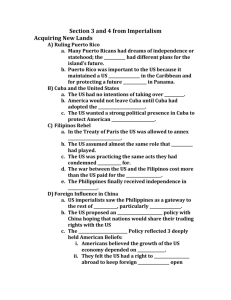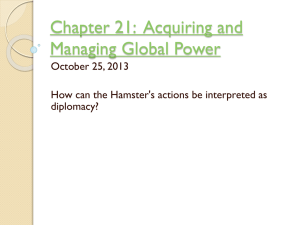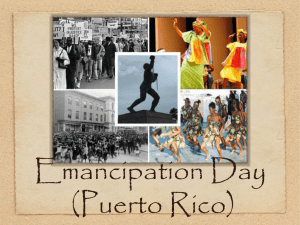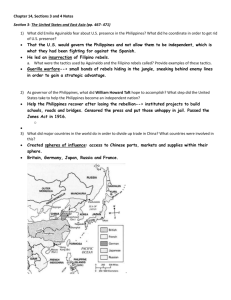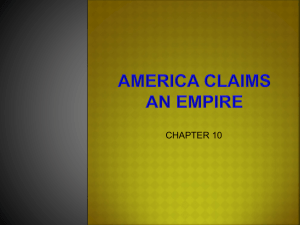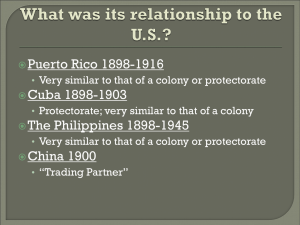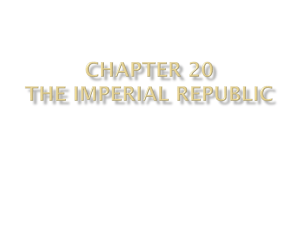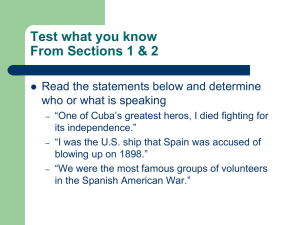Notes and Handouts Packet Imperialism
advertisement
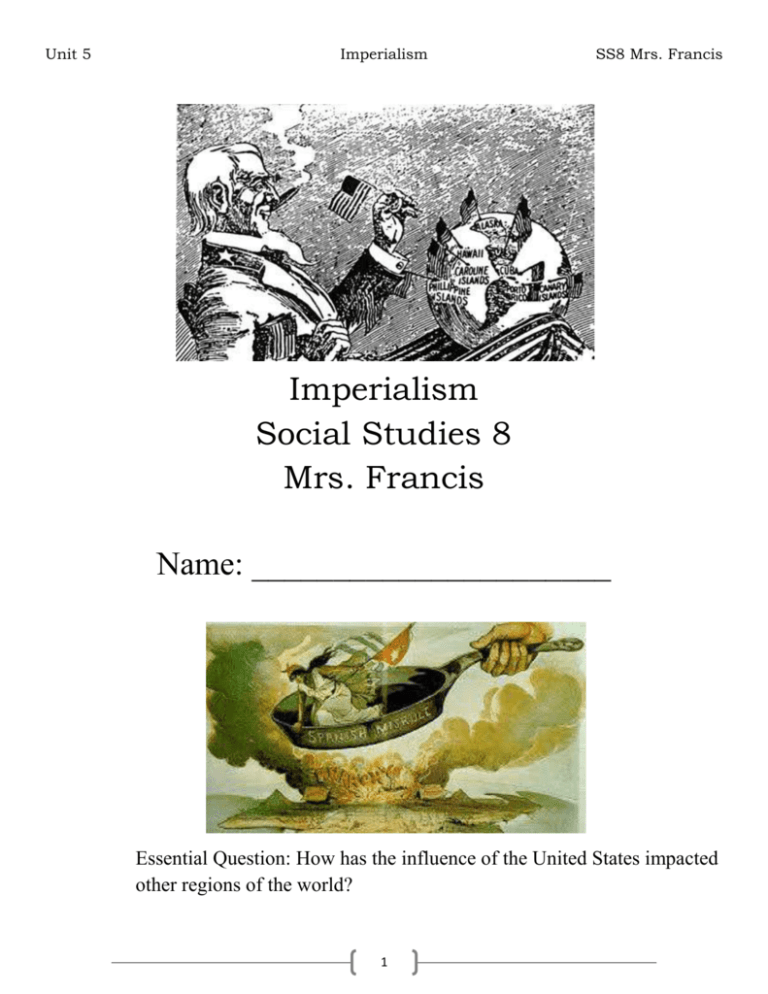
Unit 5 Imperialism SS8 Mrs. Francis Imperialism Social Studies 8 Mrs. Francis Name: ______________________ Essential Question: How has the influence of the United States impacted other regions of the world? 1 Unit 5 Imperialism AIM: Should the US have practiced Imperialism? Do Now: Define Imperialism ___________________________________________________________ HW: Topic: The Age of Imperialism (1900-1914) Industrial Revolution ____________________________________________________________ America began to look for new sources of raw materials. ____________________________________________________________ ____________________________________________________________ Close of the Frontier ____________________________________________________________ ____________________________________________________________ American Nationalism ____________________________________________________________ ____________________________________________________________ Example of European Countries Major nations of Europe were expanding ____________________________________________________________ 2 SS8 Mrs. Francis Unit 5 Imperialism SS8 Mrs. Francis Imperialism After reading the four statements below, suggest a headline in the form of a question that states the issue being considered. Then complete the exercise. 1890-1900 Headline: 1. Senator Beveridge of Indiana: God has not been preparing the English-speaking AngloSaxon peoples for a thousand years for nothing but vain and idle self-admiration. No! He has made us the master organizers of the world to establish a system in place of chaos. He has made us skilled in government so that we may manage government among savage and senile peoples. Were it not for such a force as this the world would fall back into barbarism and night. And of all our race, He has marked the American people as His chosen nation to finally lead in the regeneration of the world. 2. Professor William Sumner: We assume that what we like and practice, and what we think better, must come as a welcome blessing to people in other nations that we would control. This is untrue. They hate our ways. They are hostile to our ideas. Our religion, language, institutions, and manners offend them. They like their own ways, and if we appear amongst them as rulers, there will be rebellion. Now the great reason why saying to somebody else, “We know what is good for you better than you know yourself and we are going to make you do it,” is false and wrong is that it violates liberty; or, to turn the same statement into other words, the reason why liberty, of which we Americans talk so much, is a good thing is that means leaving people to live out their own lives in their own way, while we do the same. If we believe in liberty, as an American principle, why do we not stand by it? Why are we going to throw it away to enter upon a policy of control and regulation? 3. Admiral Alfred T. Mahan: Whether they will or not, Americans must now begin to look outward. The growing production of the country demands it. The public demands it. The 3 position of the United States between the two Old Worlds and the two great oceans demands it. The growth of the European colonies in the Pacific, the advancing civilization of Japan, and the rapid peopling of our Pacific states demands it. Therefore we need to build a more powerful navy to protect our harbors and ships and to extend our influence to other parts of the world. Moreover, there are threats to peace all over the world. For example, unsettled political conditions exist in Haiti, Central America, and many of the Pacific Islands, especially the Hawaiian group. 4. Hawaii’s former Queen Liliuokalani: We never through that our friends and allies from the United States would ever go so far as to overthrow our government, to seize our nation by the throat… Who gives the United States this “Right of Conquest,” under which robbers may establish themselves in possession of whatever they are strong enough to take? The question of taking us over is a change from the existing policy of the United States. The native People of Hawaii are faithful to our own chiefs, and are deeply attached to their own customs and government. They either do not understand, or bitterly oppose, this takeover. Oh, honest Americans, hear me for my down-trodden people! Our form of government is as dear to them as yours is precious to you. Quite as warmly as you love your country, so we love ours. With all your goodly possessions, covering a territory so immense that there yet remain parts unexplored, why do you seek our lands, so far from your shores? You will surely be punished if not in your day, then in that of your children, for “be not deceived, God is not mocked.” Unit 5 Imperialism SS8 Mrs. Francis Exercise: Using the preceding readings, list in the appropriate column below, those arguments favoring and those opposing United States imperialism. Then place an asterick (*) next the strongest argument for and strongest argument against United States imperialism. Arguments for United States Imperialism Arguments against United States Imperialism Based on what you have read, would you have been a supporter or an opponent of American imperialism at the time these opinions were written? 4 Unit 5 Imperialism SS8 Mrs. Francis Becoming a World Power Aim: How did the US acquire Alaska and Hawaii? Do Now: Define annex _____________________________________________________________ HW: Isolationism and Expansionism Isolationism: _______________________________________________________________________ Expansionism: ______________________________________________________________________ Opening trade with Japan ________________________________________________________________________ ________________________________________________________________________ Treaty of Kanagawa – accepted American demands to help ship wrecked sailors. It also opened two Japanese ports to trade. This launched trade between Japan and the west and made the Japanese aware of the power of the Western industrial nations. The Purchase of Alaska ________________________________________________________________________ William Seward saw Alaska as an important stepping stone for increasing United States commerce in Asia and the Pacific. ________________________________________________________________________ The Purchase was known as Seward’s Folly. Age of Imperialism Period between 1870 and 1914 has been called the Age of Imperialism. The policy of powerful countries seeking to control the economic and political affairs of weaker countries or regions. Reasons for Imperialism The industrial nations of Europe wanted raw materials from Africa and Asia. Many Europeans believed that they had a duty to spread their religion and culture to people who were “less civilized.” A European nation might take over an area just to keep a rival nation from gaining control. Annexing Hawaii By the mid-1800s, Americans had set up large sugar plantations in Hawaii. As the industry grew, the planters forced the Hawaiian King to reduce his power and increase the planters’ power. 5 Unit 5 Imperialism Liliuokalani resented the power of the planters. SS8 Mrs. Francis US marines arrive to protect American lives. Liliuokalani gave up her throne. ________________________________________________________________________ The Open Door Policy In the late 1800s, Britain, France, Germany, Russia, and Japan carved spheres of influence in China. ________________________________________________________________________ Sec. of State John Hay sent a letter to all nations that had spheres of influence in China – urged an Open Door Policy. ________________________________________________________________________ The Boxer Rebellion The Boxers wanted to get rid of foreigners in China. In 1900 they attacked foreigners all over China – killing over 200. John Hay sent another letter to all nations urging them to respect China’s independence. 6 Unit 5 Imperialism SS8 Mrs. Francis The United States Acquires Alaska Directions: Fill in the blank spaces in the paragraphs below with the information from the map. The map shows that there are only_________________ miles of water between Alaska and Russia. The body of water between these two land masses is called the ___________________. The Russians took profitable harvests of seal and sea otter furs from Alaskan coastal waters and islands in the years prior to 1860. In 1784, the Russians established a fur-trading settlement on ______________________Island. Then they began trapping on the mainland of Alaska. By 1860, the Russians had killed most of the furbearing animals. Then Russian interest in Alaska began to decline. In 1867, the Russians suddenly offered to sell Alaska to the United States. Secretary of State William Seward was very interested in the offer. However, some people objected to the purchase. They said that Alaska was worthless. They called Alaska “Seward’s Icebox” and the “Polar Bear Garden.” Other people said that the government had no right to buy outside territory. By “outside” they meant that Alaska was not adjacent to the United States. Seward went on a campaign to tell the people and Congress about the value of the territory. He explained that Alaska was a great bargain at only 2 cents an acre for a total of $7,200,000. Alaska was even more of a bargain than Louisiana which had cost about three cents an acre. Seward told about Alaska’s great resources of fish, lumber, and minerals. Then he offered an argument for buying Alaska that was hard to dismiss. “Suppose we did not buy Alaska,” he asked, “would you want some other nation to have it?” Finally, Seward pointed out that since it had been legal by the laws of the country to buy Louisiana, it must also be legal to buy Alaska. The arguments of Seward finally won out. In April, 1867, the United States Senate agreed to the purchase. The purchase of Alaska also included the Aleutian Islands. The United States thus added about 600,000 square miles of land to its territory. Understanding 1. On the map below, circle the Aleutian Islands. 2. The body of water just north of the Aleutian Islands is the Bering Sea. Label the Bering Sea. 3. Why did the Russians lose interest in Alaska? _______________________________________ 4. Briefly list three arguments Seward offered as reasons for buying Alaska. 7 Unit 5 Imperialism SS8 Mrs. Francis Hawaii Throughout the nineteenth century, Hawaii’s sugar cane industry grew into large moneymaking ventures. Businesses founded by descendants of American missionaries and whalers increasingly wished to dismantle the Hawaiian monarchy and to make Hawaii a territory of the United States, thereby increasing profits. However, King David Kalakaua and his sister Queen Lilioukalani who ruled Hawaii at the end of the nineteenth century hope to retain Hawaii for native Hawaiians, and preserve their own culture. In 1893, a handful of American and European residents with the help of American marines and sailors overthrew the last monarch, Queen Liliuokalani. These individuals formed the Republic of Hawaii in 1894 and elected Sanford B. Dole, the U.S. Counsel, as its first and only president. The American business executives continued to push for United States rule “under which they would be exempt from paying the high McKinley tariff imposed on foreign products shipped to the continental United States). In 1898 Hawaii was annexed as a possession of the United States, and finally, despite some Hawaiian opposition, on June 14, 1900. Hawaii became a United States territory. As such, all residents became U.S. citizens. Dole was appointed by President McKinley as the first governor of the new territory. A woman (Hawaii) and Uncle Sam are getting married, kneeling before the minister (Pres. McKinley) who is reading from a book entitled "Annexation Policy". Senator Morgan is standing watch – he had been the driving force to annex Hawaii. 8 Unit 5 Imperialism SS8 Mrs. Francis Spanish American War Aim: Should the US have gone to war with Spain? Do Now: HW: The United States added many new territories beginning in 1898. As a result the US became a world power. Many of its territorial gains came from the Spanish American War. Tales of Violence ________________________________________________________________________ This stirred American anger against Spain. In 1868, Cuban people had rebelled against Spanish rule. ________________________________________________________________________ ________________________________________________________________________ American Revolution Many Americans had invested money in sugar and rice plantations, railroads, tobacco, and iron mines. Many business leaders opposed American involvement because it might hurt trade. ________________________________________________________________________ ________________________________________________________________________ Basic Causes of War Humanitarian – Americans sympathized with the Cuban revolution Economic – _____________________________________________________________ Expansionist – war offered an opportunity to seize territory from Spain. Immediate Causes of War Yellow Journalism – Two famous American publishers Hearst and Pulitzer were battling for readers. ________________________________________________________________________ ________________________________________________________________________ The DeLome Letter – A letter written by the Spanish minister to the US, de Lome. He called McKinley weak. Sinking of the Maine – ________________________________________________________________________ ________________________________________________________________________ ________________________________________________________________________ 9 Unit 5 Imperialism SS8 Mrs. Francis United States – Cuba Relations Study the time line of United States relations with Cuba beginning in 1854. 1854 Some United States citizens favor taking Cuba from Spain by force, making it another slave state. United States government opposes move. 1868-78 Cubans try to overthrow Spanish rule, which is marked by high taxes, brutality, and lack of civil and political freedom. 1894 United States adopts new tax on imported raw sugar. 1895 Revolt in Cuba again: fighters for independence destroy sugar plantations, the heart of Cuban economy. 1896 Sugar piles up in Cuban warehouses Thousands of Cubans lose jobs as plantations close. Investment of American businessmen in Cuba threatened. Trade between Cuba and United States crippled. Spain sends General Valeriano Weyler to put down rebellion. Weyler announces strict measures: Many civilians forced to move into special relocation camps surrounded by barbed wire Those who refused to move considered enemy supporters by the army Reports reach the United States that one in four Cubans die in relocation camps as a result of disease and starvation. Questions to answer: 1. What does this worksheet tell us about relations between the United States and Cuba during the period 1854-1896? 2. If you had lived in the United States at the time, what would have been yourreaction to the events in Cuba? 3. Why were Americans so concerned with what was going on in Cuba during the1890s? 4. Considering what was happening, what should the United States government have done in response to events in Cuba 10 Unit 5 Imperialism SS8 Mrs. Francis The Role of Newspapers: Yellow Journalism The United States government was not at first eager for war with Spain. However, newspaper stories like the ones blow influenced public opinion toward the war. Underline those words in selections 1 and 2 which would have stirred up the strongest feelings of Americans against Spain. 11 Unit 5 Imperialism SS8 Mrs. Francis McKinley Calls for War On Monday, April 11, 1898, President William McKinley sent a message to the United States Congress, reviewing the events in Cuba and asking the Congress to approve military action against Spain. 12 Unit 5 Imperialism SS8 Mrs. Francis Exercise: List the reactions (for or against) that you think each group had regarding United States military intervention in Cuba. United States investors in Cuban business: ______________________________________________________________________________ ______________________________________________________________________________ ______________________________________________________________________________ Pro-imperialists in the United States: ______________________________________________________________________________ ______________________________________________________________________________ ______________________________________________________________________________ Anti-imperialists in the United States: ______________________________________________________________________________ ______________________________________________________________________________ ______________________________________________________________________________ Cuban revolutionaries: ______________________________________________________________________________ ______________________________________________________________________________ ______________________________________________________________________________ The Spanish government: ______________________________________________________________________________ ______________________________________________________________________________ ______________________________________________________________________________ 13 Unit 5 Imperialism SS8 Mrs. Francis The Effects of the Spanish American War Aim: How did the Spanish American War affect Cuba, the Philippines, Puerto Rico, and the US? Do Now: HW: The War and its Results Teller Amendment – ________________________________________________________________________ The war lasted 4 months – with fighting in the Caribbean Sea and the Pacific Ocean. ________________________________________________________________________ Of the 5,000 Americans who died, less than 400 were killed in combat – the rest died from infection and disease. Treaty of Paris ________________________________________________________________________ Gave the United States the Philippines, in return for $20 million Ceded Puerto Rico and Guam to the United States. (Hawaii, Samoa, and Wake Island were annexed in 1891 and 1899) Ruling Cuba The US had pledged to let Cuba control its own government – the promise was not kept. US troops remained in Cuba while the nation decided what to do. ________________________________________________________________________ Platt Amendment – US could intervene in Cuba and US had control of the naval base at Guantanamo Bay. ________________________________________________________________________ Ruling Puerto Rico Foraker Act – ________________________________________________________________________ 1917 – Puerto Ricans made citizens of the US The Philippines When the US took over the land, the Filipino’s fought for freedom against the US. ________________________________________________________________________ In 1902 – the US set up a government similar to the one Puerto Rico 1946 – ________________________________________________________________________ 14 Unit 5 Imperialism SS8 Mrs. Francis The Treaty of Paris, 1899 The Spanish-American War lasted fewer than four months. Spain was beaten so completely that it agreed to sign the Treaty of Paris. The important terms of the treaty are summarized below. Prior to the signing of the Treaty of Paris, the United States acquired Midway and Wake Islands. Four days after the treaty was signed, the United States annexed Hawaii. Why is the map titled “Stepping Stones to Eastern Asia”? 15 Unit 5 Imperialism SS8 Mrs. Francis Statements on the Platt Amendment The following statements were made by Cuban and United states officials in response to the Platt Amendment. Read them and complete the exercise that follows. Juan Gualberto Gomez, Cuban leader of African descent and delegate to Cuba’s Constitutional Convention: Statement 1. To give the United States the right to intervene in Cuban affairs is like giving the key to your house to a neighbor and telling him he can enter at all hours day and night whenever he wishes. Statement 2. If we ratify the Platt Amendment, we Cubans of African descent will face the discrimination which is suffered by United States Negroes. We will become second-class citizens in our own land. Representative Lacey of Iowa and Senator Platt of Connecticut during Congressional debates: Statement 3. Representative Lacey: Having at the cost of millions of dollars and the sacrifice of thousands of lives freed Cuba from her oppressors, we not only have the right but the duty to see that Spanish tyranny is not followed by anarchy (the absence of law). Statement 4. Senator Platt: In many respects the Cubans are like children. It is our duty to see that they are not destroyed by themselves, while at the same time protecting our valuable investment on the island. Report of the Cuban Constitutional Convention Committee, 1901: Statement 5. The duty of the body (group of people) in framing a constitution for our newly independent nation is to make Cuba independent of every nation. If we have to ask the United States for permission to make agreements with other nations, we are not truly free. If we obliged to surrender part of national territory to the use of the United States, we will not be truly independent in the eyes of any nation. Jose N. Ferrer, Cuban leader, in a letter to The New York Times: Statement 6. If we do not accept the Platt Amendment, we might very well be annexed by the United States and made a colony; we certainly wouldn’t want that to happen. 16 Unit 5 Imperialism SS8 Mrs. Francis Exercise: Pretend you are a reporter at a press conference on the Platt Amendment. Based on the statements on the previous page, write one question you would like to ask each speaker. Speaker Question Juan Gualberto Gomez Representative Lacy Senator Platt Chairperson of Cuban Constitutional Convention Committee Jose N. Ferrer 17 Unit 5 Imperialism SS8 Mrs. Francis The Treaty of Paris and the Philippines In the readings below, President McKinley explains his reasons for taking control of the Philippines. Filipino leader Emilio Aguinaldo gives his views regarding the United States takeover of the Philippines. According to McKinley, why did the United States decide to annex the Philippines? How does Aguinaldo explain the United States decision to annex the Philippines? 18 Unit 5 Imperialism SS8 Mrs. Francis Aim: Should Puerto Ricans have supported the Foraker Act? Do Now: What is the Foraker Act? HW: Key Ideas – Age of Imperialism Isolation ________________________________________________________________________ ________________________________________________________________________ Imperialism ________________________________________________________________________ ________________________________________________________________________ Sphere of Influence ________________________________________________________________________ ________________________________________________________________________ Boxer Rebellion Chinese who attacked foreigners all over China. They resented the foreigners who were taking control of parts of the land. Monroe Doctrine ________________________________________________________________________ Pan- American Union ________________________________________________________________________ ________________________________________________________________________ ________________________________________________________________________ Platt Amendment ________________________________________________________________________ ________________________________________________________________________ Foraker Act Gave Puerto Ricans a limited say over their own affairs. Americans set up schools, improved health care, and built roads. 19 Unit 5 Imperialism SS8 Mrs. Francis The Foraker Act and the Jones Act After the United States gained control over Puerto Rico in 1898, it set up a government under the Foraker Act in 1900. As a result of the opposition of Puerto Ricans to the Foraker Act, the Unites States passed the Jones Act in 1917. Read the two acts below, and then complete the exercise that follows. The Foraker Act, 1900 1. 2. 3. 4. 5. The Jones Act, 1917 Puerto Rico is a United States possession. Puerto Ricans are not citizens of the United States, but can elect a non-voting observer to the United States Congress. Puerto Ricans will have the right to elect the lower house of its local legislature. The upper house will be nominated by the president of the Unites States and approved by the United States Congress. The governor general, who is appointed by the president (with the advice and consent of the United States Senate), will have the power to amend or void all legislation of Puerto Rico. All foreign trade bills affecting Puerto Rican trade will be enacted by the Congress of the United States. The provisions of these bills can be changed by the Congress of the United States, if it so desires. All people of Puerto Rico shall be granted United States citizenship with all its privileges and responsibilities except the right to vote for the president of the Unites States and the right to representation in Congress. However, any citizens of Puerto Rico will have until six months after this act becomes law to refuse to accept such citizenship. The government of Puerto Rico shall consist of a governor, appointed by the president of the United States and two houses of the legislature elected by the people of Puerto Rico. Any laws passed by the legislature may be vetoed by the governor or the United States Congress. Exercise In the chart below, list the major similarities and differences between the provisions of the Foraker and Jones Acts for the government of Puerto Rico by putting a check mark in the appropriate box. Provision Foraker Act Puerto Rico will have a governor appointed by the president of the United States. Puerto Rico will have a two part law making body. One part of the law making body will be appointed by the president and the other part will be elected by the people of Puerto Rico. Both houses of the legislature (law making body) will be elected by the people of Puerto Rico. The people of Puerto Rico will have Untied States citizenship, except the right to vote for the president and representation in Congress. Any law passed by the legislature may be vetoed by the governor or the United States Congress. 20 Jones Act Unit 5 Imperialism SS8 Mrs. Francis Reactions to the Jones Act STATEMENT 1. FROM A MAINLAND NEWSPAPER: STATEMENT 2. FROM A MAINLAND MAGAZINE: Puerto Ricans were neither citizens of the United States nor nationals of another country. However, on March 2, 1917, President Wilson signed the Puerto Rican Civil Government Bill making Puerto Ricans citizens of the United States. Not all opinion in the United States endorsed the legislation known as the Jones Act. The Boston Transcript commented: We are not giving Puerto Rico by this law the full status of a territory. The treatment of Puerto Rico by the United States is much worse than its treatment by Spain, for Puerto Rican representatives were seated in the Spanish Parliament on the same terms as representatives from other parts of Spain. In the case of Puerto Rico, therefore, it can be said that we are untrusting of the people of the Island. The new law tries to restore at least a measure of self-government. According to the legislation, every male of twenty one years and over has been given the vote. In addition, the executive council which had been previously appointed by the president of the United States has been replaced by a senate of nineteen members elected by the people of Puerto Rico. Politically, therefore, this new act has improved the political status of the people of Puerto Rico. In appreciation, the legislature of Puerto Rico has set aside a special day to commemorate the passage of this act. STATEMENT 3. LUIS MUNOZ RIVERA, THE SENIOR STATESMAN OF PUERTO RICO: STATEMENT 4. JOSE DE DIEGO, A PUERTO RICAN LEADER: It is true that my countrymen have asked for American citizenship. However, we will not accept this bill which gives us second class citizenship. It does not permit our people to control their own resources, nor to share in the vital decisions which will affect their lives. Give us statehood and your glorious citizenship will be welcome to us. If you deny us statehood, we decline your citizenship. We request American citizenship with all the rights that go with it. This means citizenship with autonomy. And if we would choose between the two, we clearly prefer self-government to American citizenship without selfgovernment. Never before in international law has such a thing been seen in the democratic nations of the world. 1,200,000 human beings, who by the law of the Congress are stripped of their natural citizenship. Puerto Ricans are reduced to the condition of being foreigners in their homeland. 1. What do we learn about the reactions to the Jones Act from these readings? 2. How are the reactions to the Jones Act similar? How are they different? 3. Which seem to be the strongest arguments for supporting the Jones Act? 4. Which seem to be the strongest arguments for opposing the Jones Act? 5. With which person's reactions to the Jones Act would you have agreed most? 21 Unit 5 Facts about Puerto Rico Imperialism 1. Each fact about Puerto Rico listed below can be placed in a specific category of information. The categories are: *History (H) *Geography and Climate (GC) *Industry and Trade (IT) SS8 Mrs. Francis ____Puerto Rico is about one half the size of New Jersey. ____Columbus discovered Puerto Rico in 1493 on his second voyage of discovery. ____In 1873, the Spanish government abolished slavery in Puerto Rico. ____When the United States took over Puerto Rico, only about 20% of its 900,000 people could read or write. In 1992, about 90% of the population could do so. ____Puerto Rico has high central mountains with many small rivers flowing from them. ____Spanish is spoken in Puerto Rican schools, however, starting in first grade, English is also taught. ____Puerto Ricans do not pay income taxes to the United States government even though they are US citizens. ____San Juan, Puerto Rico’s capital, has a population of about 400,000. ____About 85% of the things Puerto Rico buys from other countries are bought from the United States. ____In 2014, Puerto Rico had a population of about 4,000,000. ____As a result of a mild climate, Puerto Rico’s main crops are sugar, bananas, coffee, tobacco, pineapples and oranges. ____In 1990, more than 155,000 Puerto Ricans were attending colleges and universities. ____The United States buys about 90% of all Puerto Rican exports. ____Puerto Rico is about 100 miles from east to west, and about 35 miles from north to south. ____About 18% of Puerto Rican workers are in manufacturing and about 3% work in agriculture. ____About 20% of Puerto Rico’s land is covered by forest. ____In November 1993, Puerto Ricans voted to decide the future of their government. The election was close: 48.4% for Puerto Rico to remain a commonwealth, 46.2% to become a state, 4.4% to become independent. *Education (E) *Government and Politics (GP) *Population (P) 2. After reading the list, decide which category each fact best fits. Write the letter(s) that represent the category on the line before each listing. The first item has been done to help you get started. ____The United States gained possession of Puerto Rico from Spain as a result of the Spanish American War. ____Because it is not a state, Puerto Rico does not have representatives in Congress who are allowed to vote. ____Puerto Ricans make three times more money from manufacturing than from agriculture. ____Puerto Rico’s most important exports are manufactured goods such as chemicals, machinery, clothing, and pharmaceuticals (medicine products). ____About 30,000 Arawak Indians lived on the island of Puerto Rico at the time it was discovered. ____Puerto Ricans may vote in United States presidential elections if they live in a state. ____The University of Puerto Rico has an enrollment of more than 25,000 students. ____In the early fall, Puerto Rico is often hit by hurricanes. ____Beginning in 1511, Africans were brought to the island to work as slaves for the Spaniards. ____Toward the end of the 16th century, the British tried to take the Puerto Rico from the Spaniards; however, their efforts failed. ____New York city has a greater Puerto Rican population than any city in Puerto Rico itself. ____In 1952, Puerto Rico became a self-governing commonwealth. ____In 1625, the Dutch tried to take Puerto Rico, but, like the British before them, they also failed. 22 Unit 5 Imperialism SS8 Mrs. Francis Aim: Was the US responsible for helping less developed nations? Do Now: Does the US get too involved today? HW: Study for quiz Relations with Latin America ____________________________________________________________________________________ ____________________________________________________________________________________ José Martí believed the real desire of the US was to achieve “ an era of United States dominion over the nations of America.” The Panama Canal ____________________________________________________________________________________ ____________________________________________________________________________________ ____________________________________________________________________________________ ____________________________________________________________________________________ Roosevelt offered $10 million cash plus $250,000 a year rent to Colombia for the strip of land. ____________________________________________________________________________________ ____________________________________________________________________________________ Revolution in Panama “Speak softly and carry a big stick, and you will go far.” ____________________________________________________________________________________ ____________________________________________________________________________________ ____________________________________________________________________________________ 1903- Panama declares independence. Building the Canal ____________________________________________________________________________________ ____________________________________________________________________________________ ____________________________________________________________________________________ ____________________________________________________________________________________ Dr. Gorgas won the battle against the mosquitoes by 1906. George Goethals supervised the job of removing more than 200 million cubic yards of earth. Controlling the Canal ____________________________________________________________________________________ ___________________________________________________________________________________ 23 Unit 5 Imperialism SS8 Mrs. Francis 1936- annual payments to Panama increased to $430,000. 1955- payments increased to $2 million a year. 1991- The Panama Canal Commission approved a project to widen a part of the canal to allow for 2 way traffic. Began in 1992 should take 20 years. ____________________________________________________________________________________ ____________________________________________________________________________________ Policing Latin America Policy of intervening in Latin America to settle disputes and disturbances. ____________________________________________________________________________________ ____________________________________________________________________________________ Most Latin Americans strongly resented this interference. Dollar Diplomacy ____________________________________________________________________________________ ____________________________________________________________________________________ Better to use trade than warships to expand American influence in Latin America. Investors helped build roads, railroads, and harbors in Latin America. Wilson and Moral Diplomacy Wilson disliked the foreign policy of his predecessors. ____________________________________________________________________________________ ____________________________________________________________________________________ ____________________________________________________________________________________ ____________________________________________________________________________________ Wilson ordered military intervention in Latin America more than any prior president. Relations with Mexico 1910- Mexicans rebelled against their president- Díaz. ____________________________________________________________________________________ ____________________________________________________________________________________ ____________________________________________________________________________________ 1914- US troops go into Mexico to help. 1916- Pancho Villa‘s soldiers killed 17 Americans. US goes in to capture Villa but fails. US withdraws in 1917. Questions to answer Why did the United States build the Panama Canal? What policies did the United States adopt toward Latin America? What impact did the US have on other nations? What were the intentions of the US Presidents during this time of imperialism? 24 Unit 5 Imperialism SS8 Mrs. Francis Review for Quiz Basic Causes____________________________________________________________________________________ ____________________________________________________________________________________ Immediate – De Lome letter, Sinking of the Maine, Yellow Journalism Economic Impact – __________________________________________________________________ Teller Amendment – US would not annex Cuba Rule over Puerto Rico – ______________________________________________________________ Boxer Rebellion – ____________________________________________________________________________________ ____________________________________________________________________________________ Foraker Act – ____________________________________________________________________________________ ____________________________________________________________________________________ Moral Diplomacy – Wilson’s plan – condemn imperialism, promote peace and democracy Platt Amendment – ____________________________________________________________________________________ ____________________________________________________________________________________ Sphere of influence – ____________________________________________________________________________________ ____________________________________________________________________________________ Yellow Journalism – ____________________________________________________________________________________ ____________________________________________________________________________________ 25 Unit 5 Imperialism SS8 Mrs. Francis The Roosevelt Corollary In 1823, President James Monroe issued the Monroe Doctrine, which told other world powers that they would not be permitted to interfere with affairs in the Western Hemisphere. In 1904, President Theodore Roosevelt issued the following corollary (conclusion or result), which he said logically grew out of the Monroe Doctrine. A Mexican diplomat’s reaction follows. THE ROOSEVELT COROLLARY, 1904 It is not true that the United States feels any hunger for land. Its only desire with regard to the countries of the Western Hemisphere is to keep them stable, orderly, and prosperous. Any country whose people conduct themselves well, keeps order, and pays its obligations, fears no interference from the United States. Constant wrongdoing, or an inability to bring order to its country, may force the United States, however reluctantly, to use its international police power. We would interfere with our southern neighbors only in the last resort, and only if it became evident that they either would not or could not do justice at home and abroad, inviting aggression from another country. A MEXICAN DIPLOMAT’S REACTION TO THE ROOSEVELT COROLLARY, 1905 No document has proven more harmful to the position of the United States in the Western Hemisphere than the Roosevelt Corollary. No United States action could be more hateful to Latin Americans- not even imperialism. This was imperialism without military glamour. To justify United States interference in the Dominican Republic, Roosevelt has interfered to protect: interfered to prevent others from so doing. It is “Invasion for Protection.” 1. What did the Roosevelt Corollary say? 2. According to the Roosevelt Corollary, why was United States interference in the Caribbean and Latin America justified? 3. What does Roosevelt mean when he says that the United States has "international police power"? 4. What did the Mexican diplomat say? 5. Why did the diplomat believe the Roosevelt Corollary hurt the United States position in Latin America? 6. Why does the Mexican diplomat say that the Roosevelt Corollary stood for “Invasion for Protection"? 26 Unit 5 Imperialism SS8 Mrs. Francis The United States in the Caribbean and Latin America (1895-1916) 1. What do we learn about the United States role in the Caribbean 1895-1916from this worksheet? 2. If you were a citizen of one of the Caribbean nations in which the United States became involved, how would you have reacted to United States actions in your country? 3. On what grounds would such involvement on the part of the United States have been justified? 4. Do you think United States actions in the Caribbean described on this worksheet were justified? 27 Unit 5 Imperialism SS8 Mrs. Francis Directions: Use your notes to complete the chart to determine whether the United States helped or hurt other nations/territories during the period of Imperialism. Country/Territory Helped Alaska Hurt Explain Hawaii Japan China Cuba Puerto Rico The Philippines Panama Latin America Mexico 28 Unit 5 Imperialism SS8 Mrs. Francis Topic: Roosevelt and the Panama Canal AIM: Could Roosevelt have used other means to get the canal built? DO NOW: Why would the US need the Panama Canal? HW : Defender of helpless Countries Pretended to help Cuba win freedom Seized Hawaii, Puerto Rico, Guam and the Philippines “Opened” Japan to trade Declared an Open door policy in China Insisted on a Close door policy in Latin America Engineered a revolution against Colombia, creating an “independent” state of Panama America as a World Power An expanded navy was needed to defend overseas colonies and markets ____________________________________________________________________________________ __________________________________________________________________________ Acquiring and then defending the Panama Canal and American possessions involved the US more deeply in affairs overseas. Questions to Answer What role did the US play in Latin America? What was the intent of the US in its foreign policy? Why was the Panama Canal so important to Teddy Roosevelt? Did he use an undesirable method of gaining control of the canal? 29 Unit 5 Imperialism SS8 Mrs. Francis The Roosevelt Corollary Directions: Use the following points from the Roosevelt Corollary to create a political cartoon of your own. It is the right of the United States to exercise international police power. It is the right of the United States to interfere in the economic matters of any nation in the Americas that cannot manage them. Explain your political cartoon: 30 Unit 5 Imperialism SS8 Mrs. Francis The Panama Canal Story For a long time people desired a canal across Panama or Nicaragua that would connect the Atlantic and Pacific Oceans. Negotiations and treaties in preparation for such a canal, however, were complex and time consuming. After reading the background headlines below, write in the reaction that you would have had to the Colombian Senate’s rejection of the Panama Canal treaty if you were President Theodore Roosevelt. The Journal 1850 Clayton-Mulwer Treaty signed U.S. and Britain agree to share control of any canal across Central America 1901 U.S. and Britain sign Hay Pauncefote Treaty. Britain agrees that U.S. alone will build and operate canal. In return, U.S. pledges to allow all nations to use the canal. 1902 French company fails in attempt to build canal. 1903 Colombia, in control of the state of Panama, agrees to allow U.S. to buy rights to build canal and pay yearly rental. 1904 Colombian Senate rejects treaty, asking for more money. President Theodore Roosevelt says: _______________________________________________ 1914 U.S. opens Panama Canal to world’s ships. 31 Unit 5 Imperialism SS8 Mrs. Francis Theodore Roosevelt and the Panama Canal After the Colombian Senate disapproved the canal treaty, Panamanians revolted against Colombia. President Roosevelt aided the Panamanians by sending warships to block Colombian troops from landing in Panama to put down the revolt. After Panama successfully revolted, it signed a treaty with the United States, giving the U.S. the right to build the Canal. As a result, the Colombian government issued the statement below, to which Roosevelt responded. THE RIGHTS OF COLOMBIA – A PROTEST AND APPEAL PRESIDENT THEODORE ROOSEVELT DEFENDS AMERICAN ACTINS IN PANAMA The United States is treating Colombia We are not dealing with normal conditions on dishonorably. The American Secretary of State the Isthmus and in Colombia. We are dealing Hay has astonished the world by finding a with the government of a dictator and with a right to prevent the troops of Colombia from condition of affairs on the Isthmus itself which going to the Isthmus of Panama to put down was marked by one uninterrupted series of the rebellion. outbreaks and revolutions. The United States violated international law by On November 3rd, the revolution occurred. recognizing the independence of Panama only Practically everybody on the Isthmus, days after the revolution and before the nation including all the Colombian troops that were of Colombia had a chance to put it down. already stationed there, joined in the Colombia did not recognize the Southern states revolution, and there wasn’t bloodshed. that seceded during the American Civil War – No one connected with the American why should the United States recognize the government had any part in preparing, seceding state of Panama? inciting, or encouraging the revolution. The United States will not escape the verdict of Panama declared itself an independent history. Never has any nation dealt with a republic. The time for hesitation on our part weak one in a way that seemed so had passed. dishonorable. In Panama, it was the action of the American people that gave the people of Panama selfgovernment, and freed them from rule by foreign oppressors. 1. What do we learn about Theodore Roosevelt’s role in the Canal’s story? 2. How did Roosevelt defend his actions? 3. Whose arguments were more convincing, the Colombian governments or Roosevelt’s? 32 Unit 5 Imperialism SS8 Mrs. Francis The Building of the Panama Canal The United States welcomed Panama’s struggle for independence from Colombia. In 1903, the United States pressured Colombia into agreeing to a treaty allowing the United States to build a canal across the Isthmus of Panama. Panama then belonged to Colombia. In exchange for the right to build the canal, the United States promised to give Colombia $10 million and a yearly rental of $250,000. Before the treaty was signed, Colombia demanded more money, and the United States refused. It looked as if the canal would never be built. The people living on the Isthmus of Panama threatened to revolt because they wanted the canal and their independence from Colombia. When they finally did revolt, U.S. President Theodore Roosevelt sent warships to Panama to show support for the revolution. With the strength of the United States behind the Panamanian people, Colombia was not able to stop the revolt, and Panama declared its independence. Within a very short time, Panama signed a treaty with the United States. The United States was given the right to build a canal, and Panama received $10million and a yearly rental of $250,000 after nine years. The Panama Canal opened in 1914. Hay-Bunau Varilla Treaty (US and Panama) 1. U.S. gives Panama $10 million plus $250,000 per year 2. U.S. controls 10 mile strip around the canal (Panama Canal Zone) 3. U.S. pledges to protect Panama’s independence 1977 Treaty (President Carter) 1. U.S. will turn over control of the Canal on December 31, 1999 2. U.S. will still be responsible for the security of the canal. Questions: 1. Did the U.S. treat Colombia fairly? 2. Did the U.S. treat Panama fairly? 3. What alternative actions could the U.S. have taken to gin the right to build and own the Panama Canal? 33 Unit 5 Imperialism SS8 Mrs. Francis AIM: What do we need to study for the test? Do Now: Take out review sheet HW: Study Review Sheet What was the primary aim of the US Open Door Policy? ___________________________________________ Why was the Panama Canal built? _____________________________________________________________ Why did the US seek colonies in the late 1890s? _________________________________________________________________________________________ What were the results of the Spanish American War? ______________________________________________ What is Yellow Journalism? How did it affect the Spanish American War? __________________________________________________________________________________________ __________________________________________________________________________________________ What was the US foreign policy in regards to Latin America? ________________________________________ Define Imperialism: __________________________________________________________________________________________ How did the Spanish American War affect US foreign policy? _________________________________________________________________________________________ Who was in support of annexing the Hawaiian Islands? _____________________________________________ Why did the US intervene in Latin America? __________________________________________________________________________________________ Why did Commodore Perry visit Japan? __________________________________________________________________________________________ How did the US acquire Alaska? _______________________________________________________________ Identify the immediate causes of the Spanish American War. __________________________________________________________________________________________ __________________________________________________________________________________________ What is Puerto Rico’s relationship with the US today? ______________________________________________ Why did the US get involved in Cuba? __________________________________________________________________________________________ __________________________________________________________________________________________ What was the Platt Amendment? __________________________________________________________________________________________ __________________________________________________________________________________________ 34 Unit 5 Imperialism What did the US gain as a result of the Spanish American War? SS8 Mrs. Francis ________________________________________________________________________________________ What is Seward’s Folly? ____________________________________________________________________ What was the name of Taft’s plan for Latin America? _____________________________________________ What was the US foreign policy after the Civil War? __________________________________________________________________________________________ __________________________________________________________________________________________ What was the boxer rebellion? A revolt of the Chinese against foreigners in 1900. What Filipino fought for independence? _________________________________________________________ What did the Monroe Doctrine allow for? Allowed the US to get involved in affairs of countries in the western hemisphere. What was the Roosevelt corollary? __________________________________________________________________________________________ __________________________________________________________________________________________ Essay Explain how we acquired 3 territories. Be sure to include historical circumstances Results of acquisition 35
